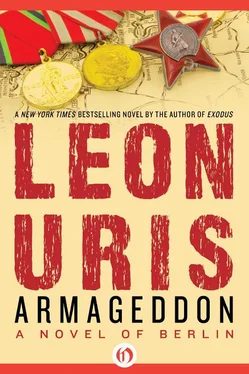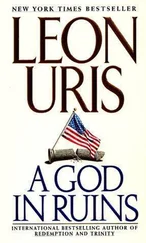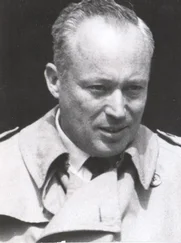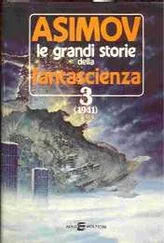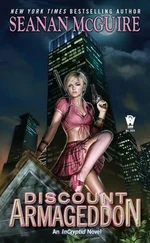Armageddon - Leon Uris
Здесь есть возможность читать онлайн «Armageddon - Leon Uris» весь текст электронной книги совершенно бесплатно (целиком полную версию без сокращений). В некоторых случаях можно слушать аудио, скачать через торрент в формате fb2 и присутствует краткое содержание. Жанр: Старинная литература, на английском языке. Описание произведения, (предисловие) а так же отзывы посетителей доступны на портале библиотеки ЛибКат.
- Название:Leon Uris
- Автор:
- Жанр:
- Год:неизвестен
- ISBN:нет данных
- Рейтинг книги:4 / 5. Голосов: 1
-
Избранное:Добавить в избранное
- Отзывы:
-
Ваша оценка:
- 80
- 1
- 2
- 3
- 4
- 5
Leon Uris: краткое содержание, описание и аннотация
Предлагаем к чтению аннотацию, описание, краткое содержание или предисловие (зависит от того, что написал сам автор книги «Leon Uris»). Если вы не нашли необходимую информацию о книге — напишите в комментариях, мы постараемся отыскать её.
Leon Uris — читать онлайн бесплатно полную книгу (весь текст) целиком
Ниже представлен текст книги, разбитый по страницам. Система сохранения места последней прочитанной страницы, позволяет с удобством читать онлайн бесплатно книгу «Leon Uris», без необходимости каждый раз заново искать на чём Вы остановились. Поставьте закладку, и сможете в любой момент перейти на страницу, на которой закончили чтение.
Интервал:
Закладка:
Well, they’ll be breaking open the oflag with G. Donald Milford in it pretty soon now.
All his thoughts began to run together ... the landing in Southern France ... the battle up the Rhone Valley ... the breaking of the Siegfried Line ... the crossing of the Rhine ... the fields of prisoners. ...
And now ... Rombaden lay out there.
Captain Maurice Duquesne walked from the bivouac and stood alongside Sean, looking in rapt fascination at the bombardment. He had taken bottles of wine and cognac out of France with him, and he passed one of them to Sean, who sipped and passed it back.
“What does one think of at one-thirty in the morning?”
“What have we left undone?”
When the Frenchman spoke or walked or drank wine he did it always with a certain gesture of his hands, a flair in his voice, his eyes. He was arrogant. Yet, he had been loyal to the team and, Sean thought, perhaps its most valuable officer. “Aha, our little paper battles at Queen Mother’s Gate.”
“You never have believed in what we were doing there.”
The Frenchman shrugged. “General de Gaulle ordered me into Military Government because of my experience.”
“You didn’t answer my question.”
“You and I have become personal friends. I do not hold you responsible because Americans are naive.”
“American naiveté is flaunted around pretty freely.”
“Take the Englishman, Sean. Take Grimwood. He knows how to rule. He knows how to conquer. And we French ... we have our little experiences also. But the Americans know neither how to conquer nor occupy. You fight your wars in behalf of neatly phrased idealism ... and then you go back to a place that has never tasted its own ashes.”
“Is it so wrong to believe in ideals?”
“Impractical. Do you really think you can learn about Germans at Queen Mother’s Gate? When you Americans leave, Germany will be here and France will be here. We have lived with the German and tasted his whip and he has tasted ours. We have mingled sweat in bed with the German women and they with French women. That is the way you must get to know people.”
“But your way hasn’t worked, Maurice. All this sweaty mingling and all your experience has produced nothing but centuries of blood and sorrow. Perhaps you shouldn’t grow deaf to the ideas of a stranger.”
“Sean! You honestly think you can change the basic nature of the German.”
“I have to.”
“I am a cynic by experience ... you are a fool by the lack of it.”
Sean wanted to say, “I believe in my country,” but he didn’t. The practical politician who had conquered and been conquered would not understand anything so maudlin.
O’Toole hurried up to them excitedly. “They’ve crossed the Landau!”
“Well then,” Duquesne said, “let us get some sleep. Rombaden faces an enlightened conqueror tomorrow.”
Chapter Fourteen
DAWN CAME WITH A crispness that gave a new life to the wet misery of the soldiers; and it brought the news that during the night a battalion of infantry had crossed the Landau in rubber boats and now held the south bank.
The day was clear, and at last they saw it ...Rombaden! The ribbon of water sweeping into the big bend, the cluster of red-tiled roofs, the lush green, and the great tower of Marienkirche. Fighter planes flying at house-top level bolted new fury into the smoking ruins.
Sean ordered the camp to be struck and the convoy to be in ready to move on the heels of a breakthrough.
At 7:22 the firing suddenly stopped. Sean rushed to regimental headquarters, where Colonel Dundee was on the phone to his forward positions. Three German officers under truce flag had come out of Rombaden and were approaching the observation post in an attempt to save the city from annihilation by a street fight.
Sean did not wait for the formal surrender ceremony. His convoy came out of the forest toward Rombaden ahead of the lumbering tanks and the infantry.
Rombaden began to take form and shape, and then an ethereal silence slowed them down as they touched the suburbs. Little fires sprouted here and there ... there was a distant drone of aircraft looking for targets farther south ... past the first little cottages ... worker’s quarters on the north end ... neat little vegetable gardens ... boxes of flowers in the windows ... roofs with holes in them ... chunks of plaster gouged out by bullets ... signs in Gothic ... “Backerei” ... “Hofmeyer’s Bierstube” ... “Apotheke” ... broken window fronts ... a house blown into the street by a direct hit.
Sean turned the convoy into the main boulevard, Friedrichstrasse, that led straight through Rombaden to the City Hall Square. It was a street of the dead. Tens of thousands of white flags of surrender welcomed the victors. The flags hung limply and the three-story buildings that lined the Friedrichstrasse were in wreckage. War had come cruelly to Friedrichstrasse. There were enormous piles of waste, charred and flaming skeletons of buildings whose walls stood by some unknown determination. All of the windows were gone and most of the roofs; the street-car line was snaked out of shape and useless; power poles snapped off; trees uprooted.
The convoy slowed to a whisper of speed.
At an intersection a dead horse lay in a pool of its own blood, swarmed over by hungry flies.
How strange, Sean thought: in every town and village a dead horse has lain open-eyed and puzzled by man’s folly.
The eyes of the men of the pilot team searched up at the broken windows knowing that tens of thousands of unseen eyes were on them. Only a fluttering of a curtain, a darting shadow, a muffled sound told of human life behind the ruins.
A single little boy stood in a doorway shading his eyes from the sun. He wore a pair of leather pants with such filth as only leather pants can gather. He was curious. A door opened behind him and the hand of a terrified mother jerked him from sight of the enemy.
The intersection where Friedrichstrasse met the City Hall Square was closed by a pile of brick and twisted steel ten feet high.
Sean halted the convoy. By hand signals they moved after him as he sprinted up the mound of bricks. Skittering and stumbling they came behind him to the City Hall Square on the Landau. The square was pocked by artillery-shell holes, the buildings cut up badly by the strafing. Sean looked first to the Marienkirche. The cathedral had been hit, but the tower with its magnificent onion dome stood by one of those miracles saved for the preservation of churches. The statue of Mary before the cathedral had been obliterated.
The half-mile-long row of buildings, the Medical College, the theater, the hospital, were all shakily intact. The statue of Hinterseer was headless on its pedestal.
All that broke the awesome silence was the shuffling of their trotting feet as they split up, began flinging doors open, moving in well-learned sequence toward those places they had seen on paper for so many months. Sean found himself running full head for the City Hall at the opposite end of the square, with Dante Arosa and O’Toole puffing behind him. Before the great building the statue of the gods Berwin and Helga, of the legend, remained intact. Damned irony! Hinterseer is headless, Mary is gone, but the pagan remains!
The door had been blown off its hinges, revealing the marble foyer filled with statues of the Von Romstein family and coat-of-arms shields of each district. Sean’s team moved in behind him up the spiral stairs, shoving open the office door. Everything was in perfect order, set for a day’s work.
The corner office on the second floor bore the name of the mayor, Baron Sigmund Von Romstein. Sean entered. It was a magnificent office. On one side the windows looked down on the City Hall Square, the other afforded a view of the Landau and the country beyond. He could see puffs of smoke and tracer-bullet streaks across the river in the district. Dundee’s battalion had engaged the enemy, perhaps the Waffen SS from the Schwabenwald Concentration Camp. The scene on the square changed by the moment. A tank plowed through ... now two ... three. Soldiers began swarming in. The engineers moved to the waterfront. Both bridges were useless. A pontoon bridge was started so that tanks and artillery could cross to join the battle in Romstein District.
Читать дальшеИнтервал:
Закладка:
Похожие книги на «Leon Uris»
Представляем Вашему вниманию похожие книги на «Leon Uris» списком для выбора. Мы отобрали схожую по названию и смыслу литературу в надежде предоставить читателям больше вариантов отыскать новые, интересные, ещё непрочитанные произведения.
Обсуждение, отзывы о книге «Leon Uris» и просто собственные мнения читателей. Оставьте ваши комментарии, напишите, что Вы думаете о произведении, его смысле или главных героях. Укажите что конкретно понравилось, а что нет, и почему Вы так считаете.
